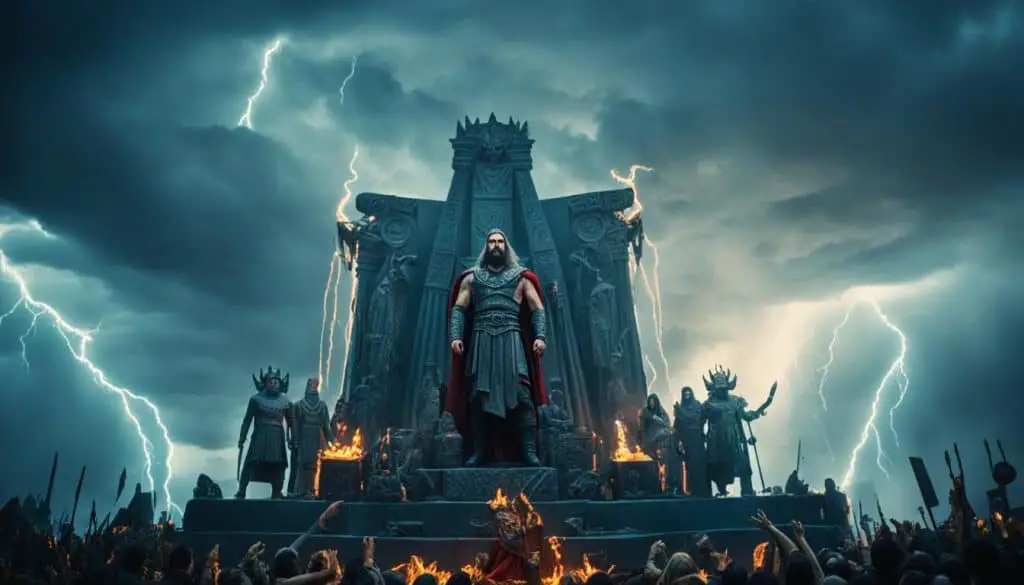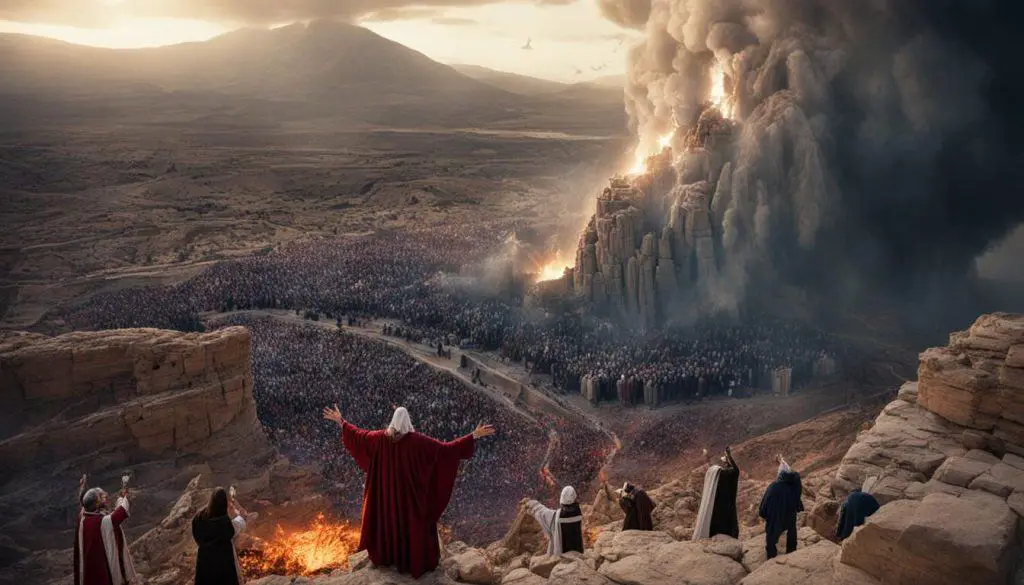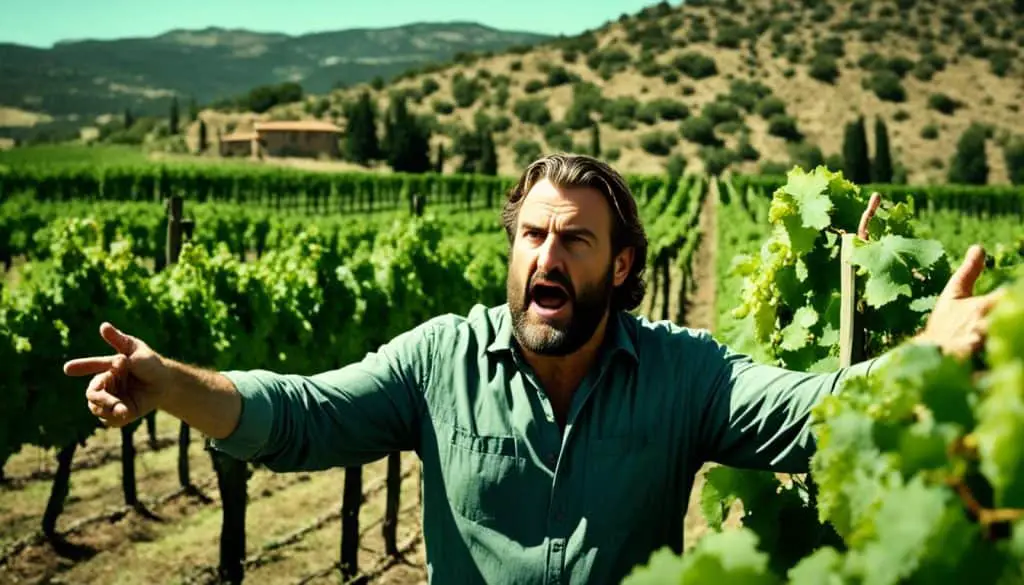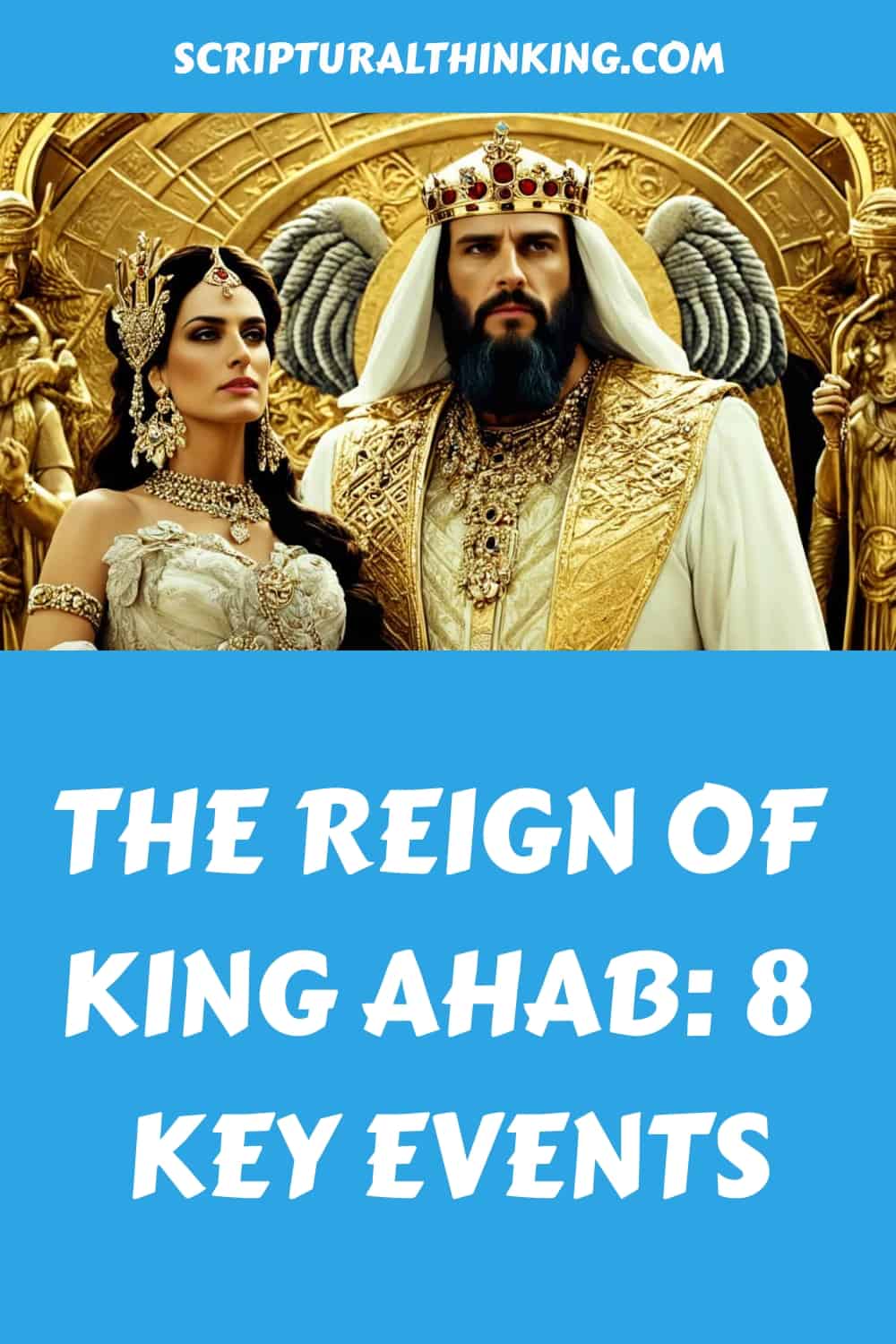Table of Contents
From scandalous affairs to divine showdowns, the reign of King Ahab in Israel was anything but ordinary. As one of the most controversial rulers in biblical history, King Ahab’s reign was marked by a series of dramatic events that shook the nation to its core. But how much do you really know about the key events that defined his rule?
Join us as we take a deep dive into the intriguing world of King Ahab, exploring the scandals, power struggles, and religious conflicts that shaped his reign. Discover the untold stories and hidden truths behind the reign of King Ahab and unravel the mysteries that surround his controversial legacy.
Get ready to challenge your beliefs and delve into the fascinating history of King Ahab’s reign in Israel. Let’s uncover the truth behind the scandals, the divine interventions, and the gripping events that will leave you questioning everything you thought you knew.
A Royal Wedding with a Twist: King Ahab and Jezebel’s Marriage.
In the tumultuous era of King Ahab’s rule in Israel, one event stands out, captivating the attention of both the people and the history books. It was a royal wedding that would forever alter the course of the kingdom, introducing an alliance that would redefine power and bring forth immense drama.
As King Ahab sought to solidify his position and expand his influence, he turned to the neighboring kingdom of Phoenicia. There, he found a bride in Jezebel, a princess with a storied lineage and a reputation that preceded her. The marriage between King Ahab and Jezebel would not only merge two royal families but also create a significant union of cultures and ideologies.
The royal wedding between King Ahab and Jezebel was an extravagant affair, attended by nobles, dignitaries, and influential figures from both Phoenicia and Israel. The celebration was adorned with grand feasts, opulent ceremonies, and elaborate displays of wealth and power.
However, beneath the surface of the festivities, there simmered cultural clashes and religious tensions. King Ahab’s people adhered to the worship of Yahweh, the God of Israel, while Jezebel brought with her the fervent devotion to the Phoenician deity Baal. This clash of faiths would ignite a firestorm of controversy and rebellion within the kingdom.
Jezebel’s presence in Israel not only introduced a foreign influence but also heralded a new era of royal alliance and political maneuvering. She used her position as queen to promote the worship of Baal, erecting temples and altars dedicated to the deity. This radical departure from the established religious practices within Israel created significant divisions and further fueled the drama within the kingdom.
Social class, cultural identity, and religious beliefs clashed in the wake of this royal wedding, paving the way for a tumultuous chapter in Israel’s history. The alliance between King Ahab and Jezebel would spark a fierce struggle for power, leading to profound consequences for both themselves and the people of Israel.
This royal wedding with its twisted turn of events would be forever etched in the annals of history, leaving a lasting impact on the kingdom of Israel. The marriage between King Ahab and Jezebel represented more than just the union of two individuals; it symbolized the collision of cultures, the emergence of a royal alliance, and the beginning of a dramatic era in Israel’s story.
The Idol Drama: King Ahab’s Altar for Baal.
During King Ahab’s reign in Samaria, he made a decision that would ignite a religious conflict that reverberated throughout the land. In an attempt to bring cultural harmony and secure political alliances, King Ahab constructed an altar for Baal, the Phoenician god.
This audacious move, although seemingly innocent, quickly turned into a dramatic spectacle known as the idol drama. The idol drama unfolded as the locals, deeply rooted in their own religious beliefs, rejected the newly introduced worship of Baal.
Prophet Elijah, a staunch advocate of the Hebrew God, was compelled to confront this religious deviation. In a bold act of defiance against King Ahab’s decree, Elijah challenged the prophets of Baal to a divine showdown at the mountain of Carmel.
Elijah proclaimed, “If the Lord is God, follow Him; but if Baal, follow him.” (1 Kings 18:21)
This quote encapsulates the intensity and fervor of the religious conflict that ensued in Samaria. The idol drama brought to light the deep divisions within the kingdom, pitting worshippers of Baal against followers of the Hebrew God.
The prophet Elijah’s unwavering faith in Yahweh and his resolute opposition to the altar for Baal added an electrifying element to the idol drama. His unwavering stance against the prevailing practices challenged the authority of King Ahab and struck fear into the hearts of those who dared to defy the Hebrew God.
Ultimately, the idol drama served as a turning point in King Ahab’s reign, marking the beginning of a battle between religious ideologies. The consequences of this religious conflict would continue to unfold, shaping the fate of Samaria.

The Escalation of Religious Tensions
The idol drama intensified as the prophet Elijah, in an act of divine intervention, called upon God to consume his offering with heavenly fire. The miraculous response not only solidified Elijah’s credibility but also heightened the conflict between the worshippers of Baal and the followers of the Hebrew God.
The altar for Baal that King Ahab built became a symbol of religious compromise, testing the loyalty and commitment of those living in Samaria. The idol drama continued to unfold, as the clash between opposing beliefs reached a boiling point.
The Consequences of King Ahab’s Decision
King Ahab’s altar for Baal not only ignited religious conflict but also had far-reaching consequences for the kingdom of Samaria. The idol drama exposed the fragile nature of political alliances and the potential dangers of compromising one’s religious identity for the sake of unity.
The ultimate outcome of this religious conflict and King Ahab’s decision to build the altar for Baal would shape the future of Samaria, leaving a lasting legacy on the kingdom and its people.
Rain, Rain, Go Away: Elijah’s Drought Declaration.
After the controversial worship of Baal, the prophet Elijah took action to confront the idolatry and its consequences. In response to the nation’s disobedience, Elijah announced a devastating drought that would grip the land. This declaration sent shockwaves throughout the kingdom, leading to a severe water crisis and adding fuel to the drama at the royal palace.
The drought that followed Elijah’s declaration was unlike anything the people had ever experienced. The skies remained cloudless, and rain became an elusive and precious commodity. Without a drop of water from above, the land withered, the crops failed, and reservoirs ran dry. The once fruitful and prosperous kingdom of Israel now faced the grave threat of famine and desperation.
The severity of the drought intensified the tension within the royal palace. King Ahab and Queen Jezebel, already entangled in controversy due to their allegiance to Baal, now found themselves facing the dire consequences of Elijah’s prophetic words. The lack of rain served as a constant reminder of their actions, as well as a source of frustration among the people.
“The land mourns, and the beasts and birds are in desperate need of water. Elijah’s declaration has brought us to the brink of disaster. We must find a solution to this water crisis before it tears the kingdom apart,” Ahab exclaimed.
The Impact of Dew
Amidst the turmoil caused by the relentless drought, a glimmer of hope emerged in the form of dew. While rain remained scarce, the land would occasionally be blessed with a gentle covering of dew in the early morning hours. This became a source of sustenance for desperate souls, offering a brief respite from the relentless dryness.
The soft touch of dew on the parched earth reminded the people that even in the midst of the crisis, there was still a glimmer of God’s provision. It brought a momentary relief, a sign that there was still life and hope amidst the chaos.
As days turned into weeks and weeks turned into months, the drought continued to test the resilience and faith of both the people and the rulers. The drama at the royal palace reached new heights as desperation grew and tensions mounted.
Amidst this turmoil, it became clear that resolving the water crisis was imperative not only for the survival of the kingdom but also for maintaining the legitimacy of Ahab and Jezebel’s rule.
Embedded within the story of Elijah’s drought declaration is a powerful reminder of the consequences of disobedience and the fragility of human power in the face of divine judgment.
The Epic Showdown at Mount Carmel.
Prepare yourself for the most epic showdown in the history of ancient Israel. It all took place on the majestic Mount Carmel, where the prophet Elijah rose to face off against not just one, but a staggering number of 450 prophets of Baal.
Imagine the scene: the holy mountain reverberating with tension as the worshippers of Baal and the faithful followers of Elijah stood face to face. There was an air of anticipation and suspense as the gathering witnessed a unique contest of divine power.
Elijah, fueled by unwavering faith in the one true God, presented a challenge to the prophets of Baal. Each side would prepare a sacrifice, and the deity who sent down fire from heaven to consume it would be declared the victor.
As the proceedings commenced, the 450 prophets of Baal fervently called upon their god, dancing and chanting with fervor. Hours went by, but there was no response. Their pleas grew louder, their desperation more apparent.
With a bold and confident demeanor, Elijah stepped forward. He prepared his sacrifice, drenched it in water three times to emphasize the impossibility of any human intervention, and then, with a heartfelt prayer, called upon the almighty God of Israel.
“O LORD, God of Abraham, Isaac, and Jacob, let it be known today that you are God in Israel and that I am your servant. Show these people that you, O LORD, are bringing them back to yourself.”
And just like that, divine intervention took center stage. Fire cascaded from the heavens, consuming the water-soaked offering in an instant. The onlookers were awe-struck, fallen to their knees, as they witnessed a clear demonstration of God’s power.
Elijah’s victorious God had proven His supremacy, leaving no room for doubt. At this pivotal moment, the people of Israel realized the significance of worshipping the one true God and rejected the false idols of Baal.
This epic showdown at Mount Carmel became a turning point in the religious and social landscape of Israel. It was a defining moment that showcased the power and faithfulness of Elijah’s God. The impact of this event rippled throughout the land, reinforcing Elijah as a powerful prophet and solidifying the truth of Israel’s monotheistic faith.

| Key Participants | Outcome |
|---|---|
| Elijah | Proved the supremacy of the God of Israel and shattered the faith in Baal |
| 450 Prophets of Baal | Witnessed the futility of their false worship and encountered divine judgment |
| The People of Israel | Renewed their faith in the one true God and turned away from idolatry |
The Speedy Getaway: Elijah Escapes Jezebel.
After the epic showdown on Mount Carmel, the tensions between Elijah and Jezebel reached a boiling point. Fueled by anger and determination, Jezebel swore to kill Elijah for his victory over the prophets of Baal. Fearing for his life, Elijah knew he had to escape Jezebel’s wrath and seek refuge.
In a daring move, Elijah embarked on a speedy getaway, outrunning Ahab’s chariot and making a break for Jezreel. With every stride, adrenaline coursed through his veins, propelling him forward as he raced against time. The urgency of his escape heightened the suspense, adding an element of danger to his journey.

The chase was on, as Elijah navigated treacherous paths and pushed his physical limits. He knew that failure to outrun Jezebel’s pursuit would lead to his demise. Every second was critical, and Elijah relied on his agility and determination to stay one step ahead.
Finally, as Jezreel came into view, relief washed over Elijah. He had successfully evaded Jezebel’s clutches and reached a temporary place of safety. The air hung heavy with suspense and anticipation as Elijah caught his breath, grateful for the narrow escape.
The speedy getaway demonstrated Elijah’s resourcefulness and ability to think on his feet. It showcased his resilience and unwavering commitment to fulfill the divine mission bestowed upon him.
The Vineyard Kerfuffle: Ahab’s Desire for Naboth’s Land.
In the midst of King Ahab’s eventful reign, a particular controversy arose that would expose the dark underbelly of power dynamics within the kingdom. This infamous incident, known as the Vineyard Kerfuffle, revolved around Ahab’s insatiable desire for Naboth’s vineyard.
Naboth, a loyal subject of Israel, possessed a piece of land that held deep sentimental value to him and his family. Ahab, driven by his greed and a lust for power, set his sights on this coveted vineyard.
His Majesty King Ahab: “I desire your vineyard, Naboth. It is the perfect addition to my royal domain. Name your price.”
Naboth, resolute and steadfast: “I cannot part with this ancestral inheritance, for it is the legacy passed down through generations of my kin. It is not to be sold or bartered, Your Majesty.”
Ahab’s disappointment soon gave way to frustration and anger. Feeling entitled to what he desired, he confided in his partner in power, Queen Jezebel, seeking her assistance in acquiring Naboth’s land.
Queen Jezebel: “My King, worry not. Leave this matter to me. I shall ensure that the vineyard is yours.”
Jezebel, a shrewd and conniving queen, hatched a deceitful plan to manipulate the situation in Ahab’s favor. She orchestrated a false accusation against Naboth, accusing him of blasphemy, a grave offense under the kingdom’s laws. Jezebel’s scheme involved gathering false witnesses to testify against Naboth, ultimately leading to his unjust condemnation and death.
Ahab, now the supposed rightful owner of Naboth’s vineyard, took possession of the coveted land. However, divine retribution was swift and unrelenting. The prophet Elijah confronted Ahab, delivering a divine message of punishment for his role in Naboth’s demise:
Elijah: “Because you have committed this evil and have taken possession of Naboth’s inheritance through deceit, doom shall befall you and your descendants. Dogs shall lick your blood in the same place where they licked Naboth’s blood.”
The Vineyard Kerfuffle exemplifies the abuse of power and the consequences that accompany it. It serves as a cautionary tale, a reminder that the pursuit of personal gain at the expense of others can lead to a severe downfall. The legacy of Ahab and Jezebel, forever tainted by their unethical behavior, serves as a stark reminder of the moral dilemmas and power struggles that plague humanity.

Key Points:
- King Ahab desires Naboth’s vineyard, leading to a manipulative scheme by Queen Jezebel.
- Naboth refuses to part with his ancestral inheritance, causing frustration for Ahab.
- Jezebel orchestrates a false accusation against Naboth, resulting in his unjust condemnation and death.
- Ahab takes possession of Naboth’s land, but divine retribution follows in the form of a prophetic message from Elijah.
- The Vineyard Kerfuffle highlights the abuse of power and the consequences of unethical actions.
How Did King Ahab’s Rule Impact the Rulers Opposing Israel in the Old Testament?
King Ahab’s rule had a significant impact on the ancient rulers opposing Israel in the Old Testament. His alliances and military campaigns against neighboring kingdoms reshaped the power dynamics in the region. The conflicts and confrontations between Ahab and the ancient rulers opposing Israel are well-documented in historical texts.
Elijah’s Not-So-Friendly Visit and the Battle of Ramoth-Gilead.
In the midst of the chaos surrounding King Ahab’s reign, a fateful encounter awaited him. Elijah, the courageous prophet, paid a not-so-friendly visit to the troubled king. This visit would have dire consequences for Ahab, ultimately sealing his fate.
But before Ahab’s downfall, the Battle of Ramoth-Gilead took place. Determined to reclaim the city from its enemies, Ahab disguised himself and entered the battlefield. However, luck was not on his side that day.
As the battle raged on, an arrow, shot seemingly at random, found its mark. It pierced Ahab’s armor, causing a fatal wound. His disguise was of no avail, for the prophecy spoke true. The consequences of Ahab’s actions had finally caught up with him, and the Battle of Ramoth-Gilead became his final chapter.
Elijah’s visit and the Battle of Ramoth-Gilead stood as stark reminders of the divine intervention and the unforgiving nature of fate. They represented the culmination of Ahab’s choices, his relentless pursuit of power, and his ultimate downfall. Truly, luck, disguise, and the consequences of his actions sealed his tragic fate forever.






